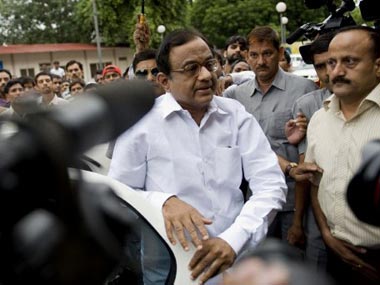Despite a liberalised Indian securities market, banks cannot trade in commodities. They are allowed to finance the commodity business, provide funds to commodity traders and also own stakes in commodity exchanges but not trade in commodities themselves.
Sine January 2012, the finance ministry has been considering an amendment to the Banking Regulation Act to allowbanks’ entry into commodity futures apart from providing similar access to mutual funds, pension funds, insurance companies and foreign institutional investors in the commodity markets.
[caption id=“attachment_555852” align=“alignleft” width=“380”]  inance Minister P Chidambaram has faced stiff opposition from the BJP and the Left since trading in commodity futures in India is believed to be volatile, speculative and inflationary. AFP[/caption]
However, Finance Minister P Chidambaram has faced stiff opposition from the BJP and the Left since trading in commodity futures in India is believed to be volatile, speculative and inflationary. In 2007, the government had suspended futures trading in key agricultural commodities due to their alleged role in triggering rapid price hikes.
The proponents, however, argue that this move would enable banks to hedge their exposures to agricultural lending arising out of price fluctuations. The Forward Markets Commission has time and again lobbied for allowing commercial banks to enter the derivative markets since they have exposures to commodities and need to hedge their price risks. T he commission has argued that if a farmer mortgages agri-output to banks and gets finance in lieu of it, then it will be in the bank’s interest to ensure the quality and quantity of the underlying commodity is maintained.
In an interview with Bloomberg earlier this year , Ramesh Abhishek, chairman of the Forward Markets Commission, had said allowing such access to futures would increase participants beyond the domestic traders, producers and consuming companies that use bourses such as the Multi Commodity Exchange of India Ltd, to banks. Banks give finance against commodities as collateral and hence they take risks on the collateral.
In other words, it would deepen the markets since bank already lend to the agriculture sector and have a fair knowledge about which crops would fail and which would do well.
In a Mint column, Tamal Bandyopadhyay argues that the entry of banks into the market will take care of the imbalance between demand and supply but the move should not be introduced without ensuring that the FMC no longer remains toothless.
“The entry of banks into this market will add depth to the market and they should be welcomed but not before the FMC becomes an independent, strong regulator. If the government is serious about reforms, it should move aggressively to amend both the banking laws and the securities contract law. Neither will work in isolation,” he says.
The FMC does not have statutory powers for compulsory registration of traders and brokers, which makes it difficult to curb illegal trading or prevent excess speculation. Without a proper regulator, speculation in the futures market for commodities can have cascading effects in the real market and fuel inflation.
For example, in 2008, as investors bought more oil futures, the price of oil in the futures market increased, which became a greater incentive to store the oil, which eventually increased the current spot price to above $145 a barrel!
As Professor Sheridan Titan from the Faculty of finance at the University of Texas argues, “if policymakers are serious about dampening volatility, they should encourage the growth in storage capacity. What does this have to do with derivatives markets? An active derivatives market makes investments in storage facilities more attractive, because it reduces the risks associated with storing commodities”.
India, however, neither has a great storage facilities (except for rice and wheat) nor does the government promise to buy all commodities at a minimum price, which is why commodity trading is considered rather risky. Also, in India, very few farm borrowers in India trade in the commodity futures exchanges.
So, while allowing banks to speculate will certainly add more depth to the market, it must not be forgotten that Indian banks do not have the product and market knowledge to trade in derivatives. Secondly, Indian banks lack market knowledge and expertise to benefit from trading in commodity futures and the RBI too has warned banks aboutrisky trading instruments.
As G Chandrasekhar argues in The Hindu BusinessLine, “Given the lack of product knowledge and market knowledge among Indian banks and given the huge volatility of commodity markets, these institutions run the risk of losing money rather than safeguard it. Policymakers have to exercise utmost caution in allowing huge speculative funds to flow into the commodities derivatives, especially agricultural goods.”


)
)
)
)
)
)
)
)
)



